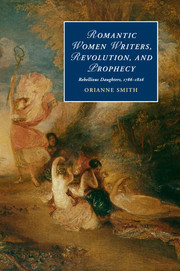Description
Romantic Women Writers, Revolution, and Prophecy
Rebellious Daughters, 1786–1826
Cambridge Studies in Romanticism Series
Author: Smith Orianne
This book challenges our current critical understanding of the relations between gender, genre, and literary authority in this period.
Language: EnglishApproximative price 31.58 €
In Print (Delivery period: 14 days).
Add to cart
Romantic Women Writers, Revolution, and Prophecy
Publication date: 10-2015
Support: Print on demand
Publication date: 10-2015
Support: Print on demand
Approximative price 104.26 €
In Print (Delivery period: 14 days).
Add to cart
Romantic Women Writers, Revolution, and Prophecy
Publication date: 03-2013
296 p. · 15.5x23.1 cm · Hardback
Publication date: 03-2013
296 p. · 15.5x23.1 cm · Hardback
Description
/li>Contents
/li>Biography
/li>
Convinced that the end of the world was at hand, many Romantic women writers assumed the role of the female prophet to sound the alarm before the final curtain fell. Orianne Smith argues that their prophecies were performative acts in which the prophet believed herself to be authorized by God to bring about social or religious transformation through her words. Utilizing a wealth of archival material across a wide range of historical documents, including sermons, prophecies, letters and diaries, Orianne Smith explores the work of prominent women writers - from Hester Piozzi to Ann Radcliffe, from Helen Maria Williams to Anna Barbauld and Mary Shelley - through the lens of their prophetic influence. As this book demonstrates, Romantic women writers not only thought in millenarian terms, but they did so in a way that significantly alters our current critical view of the relations between gender, genre, and literary authority in this period.
Introduction: reading and writing the End of the World; 1. Verbal magic: an etymology of female enthusiasm; 2. The second coming of Hester Lynch Piozzi; 3. 'I, being the representative of liberty': Helen Maria Williams and the Utopian performative; 4. The passion of the Gothic heroine: Ann Radcliffe and the origins of narrative; 5. Anna Barbauld as Enlightenment prophet; 6. Prophesying tragedy: Mary Shelley and the end of Romanticism; Epilogue.
Orianne Smith is an Associate Professor in the Department of English at the University of Maryland, Baltimore County. Her edition of Mary Robinson's Hubert de Sevrac, A Romance of the Eighteenth Century (1796) was published in 2009.
© 2024 LAVOISIER S.A.S.





